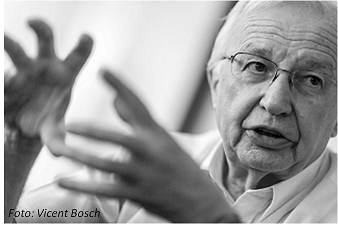|
Public lecture: Jean-Marie LEHN, Nobel Prize in Chemistry, 10th of March, 19:30h, Auditorium Guggenheim Bilbao
|
 |
|
"From Matter to Life: Chemistry? Chemistry!"
|
 |
|
The evolution of the universe has generated more and more complex matter through self-organization, up to living and thinking matter. Animate as well as inanimate matter, living organisms as well as materials, are formed of molecules and of the organized entities resulting from the interaction of molecules with each other. Chemistry provides the bridge between the molecules of inanimate matter and the highly complex molecular architectures and systems which make up living organisms.
|
 |
|
Molecular chemistry has developed a very powerful set of methods for constructing ever more complex molecules. Supramolecular chemistry seeks to control the formation of molecular assemblies by means of the interactions between the partners. The designed generation of organized architectures requires the handling of information at the molecular level in a sort of molecular programming, thus also linking chemistry with information science.
|
 |
|
The field of chemistry is the universe of all possible entities and transformations of molecular matter, of which those actually realized in nature represent just one world among all the worlds that await to be created.
|
 |
|
In this voyage from the matter to life, Jean-Marie Lehn will also present some conceptual considerations on chemistry and science in general.
|
 |
Jean-Marie LEHN, Nobel Prize in Chemistry 1987
ISIS, Université de Strasbourg, France
|
 |
|
Born in Rosheim, France. He studied chemistry at the University of Strasbourg, where he gained his PhD in 1963. Following his post doctorate studies, he spent a year at Harvard University working with Professor Robert Burns Woodward on the chemical synthesis of vitamin B12. He was appointed Professor of Chemistry at Strasbourg University in 1970, and joined the faculty at the prestigious Collège de France, Paris, in 1980.
|
 |
|
He shared the Nobel Prize in Chemistry in 1987 with Pedersen and Cram for his studies on the chemical basis of “molecular recognition” (i.e. the way in which a receptor molecule recognizes and selectively binds a substrate), which also plays a fundamental role in biological processes.
|
|

|
|
 |
|
Over the years his work led him to the definition of a new field of chemistry, which he has proposed calling “supramolecular chemistry” as it deals with the complex entities formed by the association of two or more chemical species held together by non-covalent intermolecular forces, whereas molecular chemistry concerns the entities constructed from atoms linked by covalent bonds. Subsequently, the area developed into the chemistry of "self-organization" processes and more recently towards "adaptive chemistry".
|
 |
|
Prof. Lehn is a member of many academies and institutions and has received numerous international honours and awards.
|
 |
Lecturer: Jean-Marie LEHN
When: Martes, 10 marzo, 19:30h
Where: Audiotorium of Guggenheim Bilbao museum
|
 |
Entrance is free and open to general public until capacity is complete.
The conference will be in English and there will be simultaneous translation to Basque and Spanish.
|
 |
|
Organizer: Donostia International Physics Center with collaboration of Telefónica
|
 |
 |
 |
|
|
 |
 |
 |
 |

